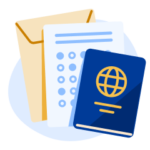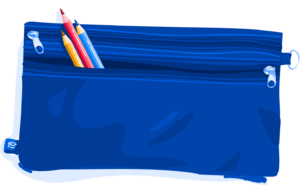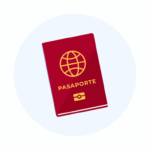Are you planning to study abroad in Canada? If so, you’ll need to apply for your study permit, also known as a student visa. A Canadian student visa allows someone to enter Canada as a student. Your study permit itself will be issued on arrival, allowing you to study full-time at a designated learning institution (or DLI) in Canada. To be eligible, you must be enrolled in a study program listed on the Canadian government’s Designated Learning Institution (DLI) list. You must apply for a student visa before travelling to Canada, and you must have all the essential documents gathered (and translated, if needed!), like a Statement of Purpose and proof of funds, before applying.
Below, we’ll break down study permit application requirements and go over what Canadian border services officers (who issue your student visa) check for. Depending on where you travel from, your requirements may vary. Also, study permit guidelines and requirements are subject to change.
Stay up to date by checking the Government of Canada’s international student resources. The Government of Canada’s website is the official source of information for students who want to study in Canada.
Note: In addition to your study permit, you must also obtain a temporary resident visa or electronic travel authorization (eTA). Thankfully, this is incorporated into the application process, so you’ll most likely receive one automatically just by applying for your study permit.

Letter of Acceptance (LOA) and Provincial or Territorial Attestation Letter
If you still have to choose your program and institution, it’s time to do that. Once you have selected your program, your college or university will send you an official letter of acceptance (LOA) if you’re accepted into the program. You must include the original LOA with your student visa application.
Students who will study in Québec must also apply for a Certificat d’acceptation du Québec (Certificate of Acceptance to Québec, or CAQ). Most temporary foreign workers and students who intend to live in Québec require a CAQ.
Starting in 2024, most international students must also include a Provincial Attestation Letter (PAL) or Territorial Attestation Letter (TAL) with their study permit application. It certifies that the student has been assigned one of the available spaces to study in that province or territory.
Proof of Identity for Canada Student Visa
You must submit a valid passport or travel document, as well as two recent passport-size photos. Please include your name and date of birth on the back of both photos. Also, you should have a minimum of one blank page in your passport for your student visa to go on.
If you have family members travelling to Canada with you, each member is also required to submit their own application. If possible, we recommend applying for your visas together, to prevent delays. Adults and children may have different requirements. These documents must allow you and your family to return to your home country.

Purpose of Visit
This is your opportunity to share why you wish you come to Canada: to enhance your education. You may need to share certain details or supporting documents within this step, such as your past education credentials, work experience, career plans and progression, and a language proficiency test. Commonly accepted language proficiency tests include IELTS, TOEFL, and PTE.
Proof of Funds for a Canadian Student Visa
You must have the financial capacity to support yourself, and your family members if applicable. This may also be referred to as proof of funds for Canada student visa, or proof of financial support. Learn more about how to assemble your proof of financial support on our blog.
You can prove you have the financial capacity to afford your international studies in Canada with:
- A letter of support from your parents, other family members, or your school
- Current bank statements (requirements vary, but from within the last six months are best)
- Balance certificates
- Proof of a Canadian bank account in your name
- Documentation of a student loan and/or scholarships
- Proof of tuition and housing payments
- Sources of income of your financial sponsor, if applicable.
Note that the minimum financial requirement to study in Canada increased in September 2025. You’ll need to show you have access to at least C$22,895, in addition to your travel costs and first year of tuition, in order to receive your study permit.
In fact, the minimum financial requirement amount is set in line with the cost of living, and is updated regularly by the Government of Canada.
Want to strengthen your proof of funds? ApplyBoard partners with the Royal Bank of Canada (RBC) and TD Bank to offer GIC services which can strengthen your study permit application. Apply now!

Letter of Explanation or Statement of Purpose
Part of what Canadian visa officers check for when deciding to grant you a Canadian student visa is your letter of explanation or statement of purpose. This letter must help the person reading your application understand why you’re coming to Canada. It’s an opportunity to explain why you want to study in Canada, and what makes you a great candidate for your program.
It’s important to acknowledge the responsibilities of an international student as well. If you have a gap in your studies, low grades, or have chosen a different field than your previous area of education, the statement of purpose included in your Canadian study permit application is where you can explain your rationale.

Ties to Your Home Country
Though you won’t need to attach a separate document, you’ll need to fill out this section in the study permit application. Here, you must show your economical and emotional incentive to return to your home country after graduation. Think of things like your family, any property you own or rent, investments, or similar ties.

Personal Documents
You may need to include additional documents, depending on the requirements of your country. You may have to provide the following:
- Biometrics
- Police clearance certificate
- Detailed Curriculum Vitae (CV) or resume
- Birth Certificate
- Marriage Certificate (if applicable)
Important Note: Are any of your required documents not written in English? You’ll need to include a full translation of those documents, as well as the name and contact information of your translator.
All information is sourced from the Government of Canada.
Ready to start your study abroad journey? Contact the team at ApplyBoard! We’re here to help.




